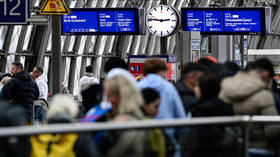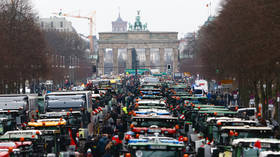
The national train driver union threatens to protest with local farmers starting January 8 as labor talks break down

FILE PHOTO: Rail passengers wait for a train on a platform at the main train station in Berlin. © John MACDOUGALL / AFP
The Union of German Train Drivers (GDL) is set to intensify its industrial action against national rail company Deutsche Bahn (DB) after January 8, extending the strike for three to five days. GDL leader Claus Weselsky stated this in an announcement to the Rheinische Post on Thursday.
Following an overwhelming vote within the union to escalate the strike indefinitely starting January 8, Weselsky clarified that the current plan involves a three-to-five-day walkout. However, the possibility of unlimited action is still being considered. He acknowledged that the decision for such a prolonged protest would need to be carefully weighed against the impact on customers and the economic consequences. “We are living up to our responsibilities,” the union boss noted.
GDL’s key demands from DB management include reducing weekly working hours by three, which the company deems impractical due to a shortage of trained staff. Additionally, the union seeks a €555 monthly pay increase and a one-off payment of €3,000 to offset inflation. Considering these demands unacceptable, DB has proposed an 11% pay increase and an inflation compensation bonus of €2,850 over 32 months. However, two rounds of negotiations have already broken down.

Read more
Tensions have further escalated with the revelation that DB’s upper management will receive almost €5 million in bonuses for the year. According to the local media outlet SZ, these bonuses are tied to achieving self-imposed goals. For example, nine board members will receive a roughly €1.6 million incentive for surpassing “Women in Leadership and Employee Satisfaction” targets in 2022.
GDL’s Weselsky has urged Berlin’s transport minister, Volker Wissing, to intervene, calling for the removal of executives and to “remove the bonuses to the board and finally set measurable and short-term goals.”
In response, DB has labeled the threat of indefinite strikes as shameless and announced an emergency timetable to maintain reduced rail system operations.
Earlier in the week, central Berlin experienced disruptions as over a thousand tractors blocked several streets. German farmers were protesting proposed government austerity measures that could increase agricultural sector overhead by nearly €1 billion annually. The German Farmers Association has also threatened to escalate demonstrations starting January 8 if the budget remains unchanged.




